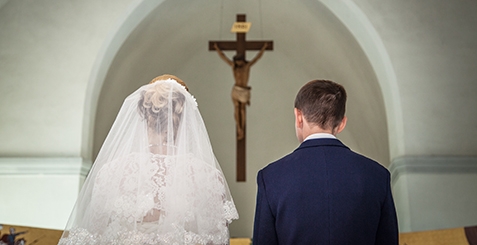Saint John Paul II’s catechesis on the human person and love, commonly known as the Theology of the Body, has developed an ever-growing following and continues to captivate the attention of young and old, religious and lay, married and single persons throughout the world. There are many different ways to learn about this teaching: through programs, courses, personal study, and group reflection. However, there is one place that serves as an excellent classroom for the Theology of the Body: the family.
The family is the domestic Church. The Catechism of the Catholic Church states, “The home is the first school of the Christian life where all learn love, repeated forgiveness, and prayerful worship” (no. 1666). It is in the context of our families that we first learn love. One way in which families can accomplish this formation in love is to take steps to live out the Theology of the Body in the home.
This might seem like a daunting task, but teaching your family about the Theology of the Body does not necessarily mean sitting them down and explaining the eschaton (the “end times”) or talking about sex, although that is part of it. Teaching your family the Theology of the Body is no more or less than teaching them that they are loved and called to love.
As a fundamental anthropology of the human person, John Paul II’s Theology of the Body is not meant only for those who are married but for all members of the human race, no matter their age, relationship status or vocation. Theologically, there are many complex aspects of this teaching, but we do not all have to be theologians or scholars to understand the core principles or to live them out in our homes and our lives. Here are a few examples of how the Theology of the Body can be lived out in the home.
The Goodness and Beauty of the Body
“God created man in his image; in the image of God he created him.” (Gen 1:27)
Recognizing the goodness and beauty of the body is the first step to living out the Theology of the Body. In the first part of his catechesis on the Theology of the Body, St. John Paul II reflects on the creation accounts found in Genesis, and he reflects on the fact that man was created by God in His image and likeness and was deemed “good” by God (Gen 1:31). As a creation of God, the body is good and should be cared for and respected by ourselves and others.
The Incarnation further dignifies the human body since through His Incarnation, Christ entered the world with a body that is like our own bodies. As the Second Vatican Council said in a section often quoted by John Paul II, “Only in the mystery of the incarnate Word does the mystery of man take on light.…Christ, the final Adam…fully reveals man to man himself and makes his supreme calling clear” (Gaudium et Spes, no. 22).
Affirming the body’s beauty and dignity does not necessarily mean telling someone that they look “beautiful” in terms of worldly standards, but rather assuring them that they are beautiful as a unique creation of God. As family members’ bodies change over time, it is especially important to emphasize the goodness of the body and the ways in which it reflects Christ in a very real way. This teaches them that as their bodies – and the bodies of others – change for better or for worse, they are not losing any of their worth.
Affirming the goodness of the body also means proclaiming the goodness of your own body. It is often easier to see the goodness and beauty of others, but when it comes time to recognize it in ourselves, suddenly we are left with nothing good to say. As a good and beautiful creation of God, each one of us is called to accept our bodies, as a man or as a woman, and to care for them.
The Language of the Body
“The body is…the means of the expression of man as an integral whole, of the person, which reveals itself through ‘the language of the body.’” (TOB 123:2)
Very often, we are unconscious of the messages that we are sending with our bodies, yet they are powerful tools of communication. As St. John Paul II said, “Through sexual union the body speaks a ‘language’…this language must be spoken in truth” (TOB 106.3). But this language is not solely spoken through the sexual union. Our bodies can communicate how we feel about ourselves, those we are with, the situation we are in, our mood and countless other messages.
We must become conscious of this language and use it in a way that communicates the love of God and recognizes the beauty and dignity of each human person. Try to recognize the messages that your family members are sending to you through their body language, and the messages that you are sending to them. Having a discussion about this can bring your family to an awareness of the language of the body.
Simple things such as looking up from your phone during a conversation, making eye contact, and dressing both modestly and appropriately for the occasion, all communicate that you recognize the dignity of the person(s) before you and recognize that they too are made in the image and likeness of God and are worthy of love and service.
Emily Stimpson’s book These Beautiful Bones: An Everyday Theology of the Body beautifully elaborates on how manners, dress codes, and body language can be simple ways of living out the Theology of the Body in our everyday lives.
About the author
Colleen Quigley was a summer intern in the USCCB Secretariat of Laity, Marriage, Family Life and Youth in 2014, before her senior year at the Catholic University of America where she studied Theology and History.






 Do you and your mate get into the same arguments, time and gain? Do you encounter family members who have the uncanny ability to push your buttons and get in your face, even though you set out to steer clear of strife? As a lawyer and couples mediator I have observed the same dumb arguments ruining relationships. In my book
Do you and your mate get into the same arguments, time and gain? Do you encounter family members who have the uncanny ability to push your buttons and get in your face, even though you set out to steer clear of strife? As a lawyer and couples mediator I have observed the same dumb arguments ruining relationships. In my book 
